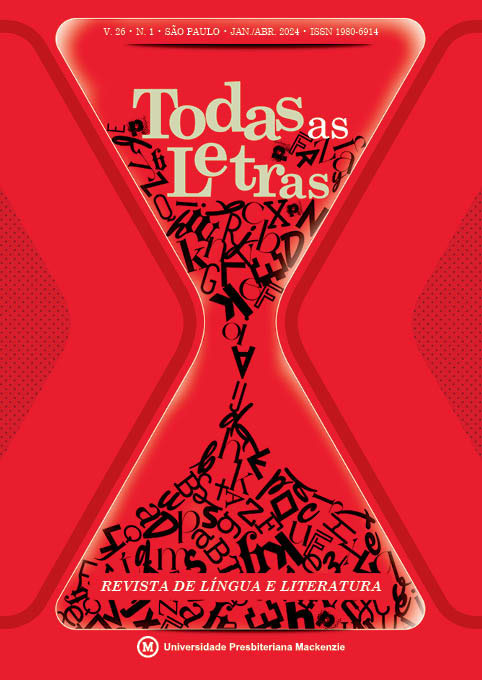Torto arado and the extended peripheral space experience
Keywords:
Country, City, Periphery, Crooked plow, Itamar Vieira JuniorAbstract
The main objective of this article is to analyze the novel Crooked Plow [Torto arado], by Itamar Vieira Junior, as a contemporary literary expression that resumes themes and tensions addressed by Brazilian literature in the past. Vieira Junior’s work brings the universe of the countryside to the center of the narrative, emphasizing its social and agrarian conflicts, at a time when the Brazilian fiction focuses on urban spaces and subjects. In this novel, the themes of exclusion, oppression and class ideologies are revisited with a contemporary perspective. It is concluded that Crooked Plow resumes old forms pertaining to the representation of the rural environment, but at the same time it is consistent with the current fictional production.
Downloads
References
BATISTA JUNIOR, João. O livro que voou nas redes. Piauí, 19 fev. 2021. Questões literárias. Disponível em: <https://piaui.folha.uol.com.br/o-livro-que-voou-nas-redes/>. Acesso em: 22 abr. 2022.
BRANDÃO, Luis Alberto. Espaços literários e suas expansões. Aletria, Belo Horizonte, v. 15, jan./jun. 2007.
BOURDIEU, Pierre. As regras da arte: gênese e estrutura do campo literário. Tradução Maria Lucia Machado. 2. ed. São Paulo: Companhia das Letras, 2010.
CANDIDO, Antonio. Formação da literatura brasileira: momentos decisivos 1750-1880. 11. ed. Rio de Janeiro: Ouro sobre Azul, 2007.
CAPUANO, Amanda. “Torto Arado” desbanca autoajuda e é o livro mais vendido do ano na Amazon. Veja, 27 dez. 2021. Cultura. Disponível em: <https://veja.abril.com.br/cultura/torto-arado-desbanca-autoajuda-e-e-o-livro-mais-vendido-do-ano-na-amazon/>. Acesso em: 22 abr. 2022.
DALCASTAGNÈ, Regina. Sombras da cidade: o espaço na narrativa brasileira contemporânea. Estudos de Literatura Brasileira Contemporânea, Brasília, n. 21, p. 33-53, jan./jun. 2003.
DALCASTAGNÈ, Regina. Radiografia da literatura brasileira. Entrevista concedida a Luiz Rebinski Junior. Cândido, Curitiba, n. 33, abril 2014. Disponível em: <https://www.bpp.pr.gov.br/Candido/Pagina/Candido-Ndeg-33-Abril-2014>. Acesso em: 21 dez. 2022.
GINZBURG, Jaime. O valor estético: entre universalidade e exclusão. Alea: Estudos Neolatinos, Rio de Janeiro, v. 10, n. 1, p. 98-107, jan./jun. 2008.
MARQUES, Geisa. Itamar Vieira Jr: “O Brasil está encalhado no passado, que resiste em ser superado” [Entrevista]. Brasil de Fato, 10 fev. 2021. Disponível em: <https://www.brasildefato.com.br/2021/02/10/itamar-vieira-jr-o-brasil-esta-encalhado-no-passado-que-resiste-em-ser-superado>. Acesso em: 25 jul. 2022.
MATTOS, Ricardo Mendes. O processo de criação de Torto Arado: o agente público, o cientista e o escritor. Rotura – Revista de Comunicação, Cultura e Artes, Faro – Portugal, v. 1, n. 2, p. 49-57, 2021.
MORICONI, Italo. Prefácio. In: TORRES, Antônio. Essa terra. Rio de Janeiro: BestBolso, 2008. p. 7-10.
PATROCÍNIO, Paulo Roberto Tonani do. A volta da realidade das margens. Estudos de Literatura Brasileira Contemporânea, Brasília, n. 39, p. 57-75, jan./jun. 2012.
PELLEGRINI, Tânia. As vozes da violência na cultura brasileira contemporânea. Crítica Marxista, Campinas, n. 21, p. 132-153, 2005.
SCHØLLHAMMER, Karl Erik. Ficção brasileira contemporânea. Rio de Janeiro: Civilização Brasileira, 2009.
VIEIRA JUNIOR, Itamar. Torto arado. São Paulo: Todavia, 2019.
Downloads
Published
How to Cite
Issue
Section
License
Copyright (c) 2024 Márcio Miranda Alves, André Tessaro Pelinser

This work is licensed under a Creative Commons Attribution-NonCommercial 4.0 International License.
The originals accepted and published become property of Mackenzie Presbyterian University, being forbidden their total or partial reproduction without permission of the Editorial Board, except for study and research.




